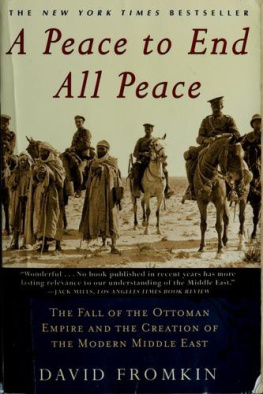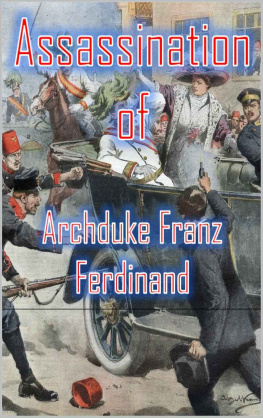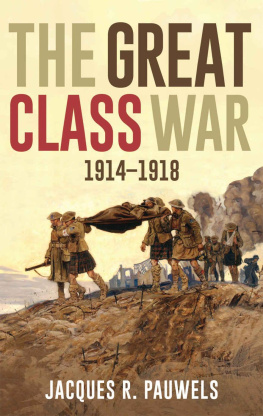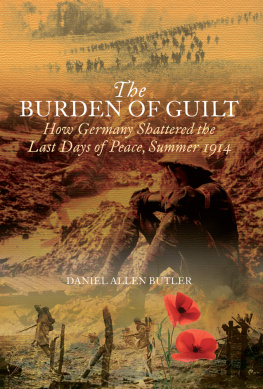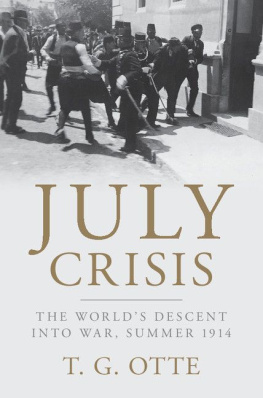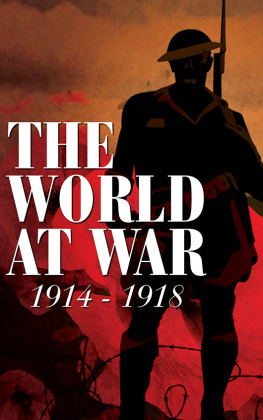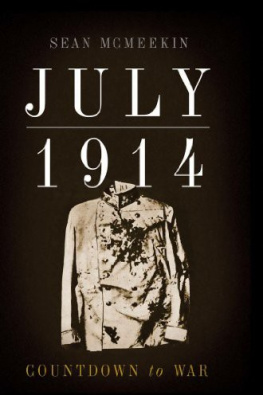EUROPE'S LAST SUMMER
David Fromkin is Professor of International Relations, History and Law at Boston University. He has written six other books, including A Peace to End All Peace, which was shortlisted for the Pulitzer Prize. He lives in New York City.
ALSO BY DAVID FROMKIN
The Way of the World
Sarajevo Crossing
In the Time of the Americans
A Peace to End All Peace
The Independence of Nations
The Question of Government
This eBook is copyright material and must not be copied, reproduced, transferred, distributed, leased, licensed or publicly performed or used in any way except as specifically permitted in writing by the publishers, as allowed under the terms and conditions under which it was purchased or as strictly permitted by applicable copyright law. Any unauthorised distribution or use of this text may be a direct infringement of the author's and publisher's rights and those responsible may be liable in law accordingly.
ISBN 9781409044024
Version 1.0
www.randomhouse.co.uk
Published by Vintage 2005
2 4 6 8 10 9 7 5 3
Copyright David Fromkin 2004
David Fromkin has asserted his right under the Copyright,
Designs and Patents Act, 1988 to be identified as the author
of this work
This electronic book is sold subject to the condition that it shall not by way of trade or otherwise, be lent, resold, hired out, or otherwise circulated without the publisher's prior consent in any form other than that in which it is published and without a similar condition including this condition being imposed on the subsequent purchaser
All photographs are reprinted with the kind permission of
the Illustrated London News Library except: 'Colonel
Edward House' and 'Count Graf Berchtold' (Hulton-Deutsch
Collection/Corbis); 'German General Erich von
Falkenhayn' (Corbis); and 'German Admiral Alfred von
Tirpitz' (Bettman/Corbis)
Published by arrangement with Alfred A. Knopf,
a division of Random House, Inc., New York
First published in Great Britain in 2004 by
William Heinemann
Vintage
Random House, 20 Vauxhall Bridge Road,
London SW1V 2SA
Random House Australia (Pty) Limited
20 Alfred Street, Milsons Point, Sydney
New South Wales 2061, Australia
Random House New Zealand Limited 18 Poland Road, Glenfield, Auckland 10, New Zealand
Random House (Pty) Limited
Isle of Houghton, Corner of Boundary Road & Carse O'Gowrie,
Houghton 2198, South Africa
Random House Publishers India Private Limited
301 World Trade Tower, Hotel Intercontinental Grand Complex,
Barakhamba Lane, New Delhi 110 001, India
The Random House Group Limited Reg. No. 954009
www.randomhouse.co.uk/vintage
A CIP catalogue record for this book
is available from the British Library
ISBN: 9781409044024
Version 1.0
For Alain Silvera
The peremptory transition from an apparently profound peace to violent general war in a few midsummer weeks in 1914 continues to defy attempts at explanation.
JOHN KEEGAN, The First World War
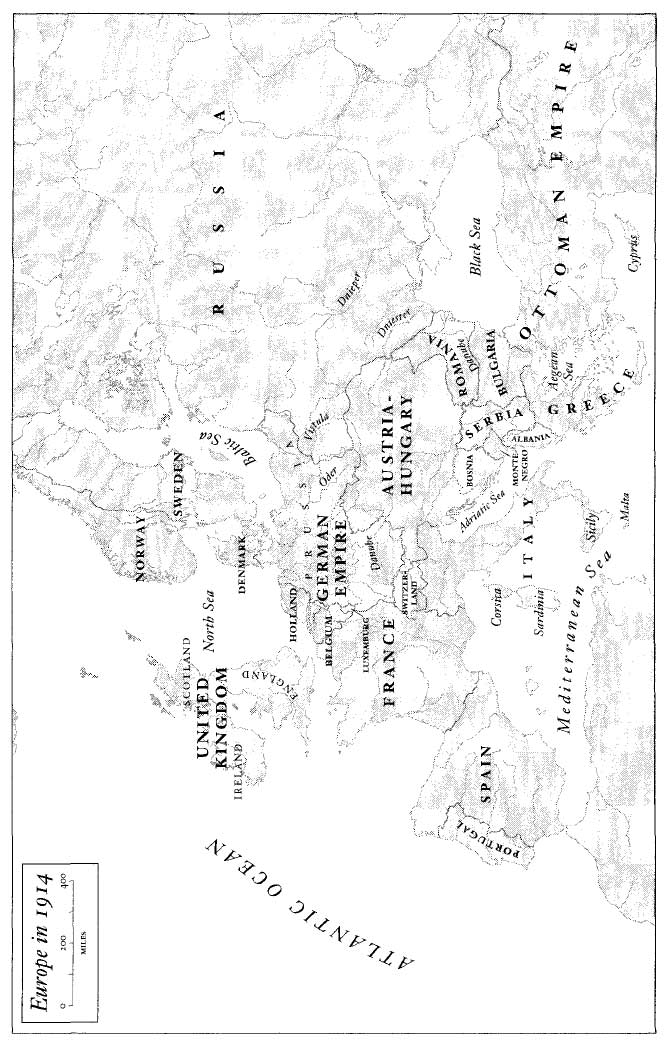
EUROPE'S LAST SUMMER
PROLOGUE:
(i) Out of the Blue
Shortly after eleven o'clock at night on Sunday, December 29, 1997, United Airlines Flight 826, a Boeing 747 carrying 374 passengers and 19 crew, was two hours into its scheduled trip across the Pacific from Tokyo to Honolulu. It had reached its assigned cruising altitude of between 31,000 and 33,000 feet. Meal service was about to be completed. It had been an uneventful trip.
In a terrifying instant everything changed. The plane was struck, without warning, by a force that was invisible. The aircraft abruptly nosed up; then it nosed down into a freefall. Screaming bodies were flung about promiscuously, colliding with ceilings and with serving carts. A thirty-two-year-old Japanese woman was killed and 102 people were injured. Regaining control of the jumbo jet, the captain and cockpit crew guided Flight 826 back to the Japanese airport from which it had taken off hours before.
What was so frightening about this episode was its mysteriousness. Until the moment of impact, the flight had been a normal one. There had been no reason to expect that it would be anything else. There had been no warning: no flash of lightning across the sky. You couldnot see it coming, whatever "it" may have been. Passengers had no idea what had hit them and airline companies were in no position to assure the public that something similar would not happen again.
Experts quoted by the communications media were of the opinion that Flight 826 had fallen victim to what they called "clear air turbulence." They likened this to a horizontal tornado, but one that you could not see. Some of the experts who were interviewed expressed the hope that within a few years some sort of sensing technology would be developed to detect these invisible storms before they strike. Transparency, the public learned from this episode, signifies little; a pacific sky can rise up in wrath as suddenly as can a pacific ocean.
Something like such an attack of clear air turbulence is supposed by some to have happened to European civilization in 1914 during its passage from the nineteenth to the twentieth century. The world of the 1890s and 1900s had been, not unlike our own age, a time of international congresses, disarmament conferences, globalization of the world economy, and schemes to establish some sort of league of nations to outlaw war. A long stretch of peace and prosperity was expected by the public to go on indefinitely.
Instead, the European world abruptly plunged out of control, crashing and exploding into decades of tyranny, world war, and mass murder. What tornado wrecked civilized Old Europe and the world it then ruled? In retrospect, it may be less of a mystery than some of those who lived through it imagined. The years 1913 and 1914 were ones of dangers and troubles. There were warning signs in the early decades of the twentieth century that catastrophe might well lie ahead; we can see that now, and military and political leaders could see it then.
The sky out of which Europe fell was not empty; on the contrary, it was alive with processes and powers. The forces that were to devastate itnationalism, socialism, imperialism, and the likehad been in motion for a long time. The European world already was buffeted by high winds. It had been traversing dangerous skies for a long time. The captain and the crew had known it. But the passengers, taken completely by surprise, insistently kept asking: why had they received no warning?
(ii) The Importance of the Question
In the summer of 1914 a war broke out in Europe that then spread to Africa, the Middle East, Asia, the Pacific, and the Americas. Known now, somewhat inaccurately, as the First World War, it ended by becoming in many ways the largest conflict that the planet had ever known. It deserved the name by which it was called at the time: the Great War.
To enter the lists, countries of the earth ranged themselves into one or another of two worldwide coalitions. One, led by Great Britain,*France, and Russia, was called the Triple Entente; the other, led by Germany and Austria-Hungary, was known at first as the Triple Alliance. Between them the two coalitions mobilized about 65 million troops. In Germany and France, nations that gambled their entire manhood on the outcome, 80 percent of all males between the ages of fifteen and forty-nine were called to the colors. In the ensuing clashes of arms they were slaughtered.
*Beginning in 1801, the official title of Great Britain was the "United Kingdom of Great Britain and Ireland"; for short, the United Kingdom.


